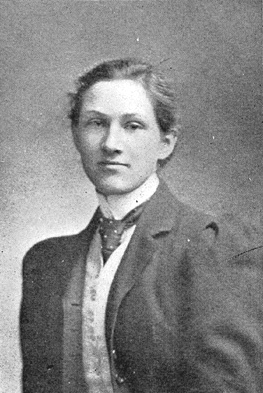Edith Houghton Hooker facts for kids
Quick facts for kids
Edith Houghton Hooker
|
|
|---|---|

At Bryn Mawr College in 1901
|
|
| Born |
Edith Houghton
December 29, 1879 |
| Died | October 23, 1948 (aged 68) |
| Education |
|
| Occupation | |
| Relatives | See Houghton family |
| Awards | Maryland Women's Hall of Fame |
Edith Houghton Hooker (December 29, 1879 – October 23, 1948) was an American suffragist and social worker. She was a leader in the movement for women's right to vote in Maryland. After she passed away, she was added to the Maryland Women's Hall of Fame. She was also the aunt of the famous actress Katharine Hepburn.
Contents
Early Life and School
Edith Houghton was born in 1879 in Buffalo, New York. Her family, the Houghton family, was well-known. Her parents were Caroline Garlinghouse and Alfred Augustus Houghton. Her sister was Katharine Martha Houghton Hepburn, who also worked for women's rights.
Edith's father died in 1892. Her mother, Caroline, strongly believed that girls should get a good education. Before her mother died in 1894, she made sure her daughters would go to college. Even though some relatives wanted them to go to a traditional finishing school, Edith and Katharine were allowed to go to college.
Edith went to Bryn Mawr College and finished in 1901. Then, she moved to Baltimore to study at the Johns Hopkins School of Medicine. She was one of the first female students there. At Johns Hopkins, she met Donald Hooker, a professor. They got married in June 1905. They had five children and adopted three more.
Helping Others: Social Work
After college, Edith Hooker studied for a year in Berlin. When she came back to Baltimore, she started working as a social worker. She believed in equal rights for everyone, especially women. She wrote about her ideas on equality and women's rights.
Edith and Donald Hooker started an organization called the Guild of St. George in Baltimore. This group helped single mothers and their children by giving them homes and support. Edith Hooker was the president of the Guild from 1906 to 1911. Through this work, she taught people about public health and women's rights. She also did research and wrote articles about her findings.
Fighting for Women's Right to Vote
Edith Hooker realized that the best way to make big changes was to help women get the right to vote. In 1907, she joined the Equal Suffrage League of Baltimore. But in 1909, she left to start her own group, the Just Government League. This group was connected to a bigger national organization.
Starting in 1910, she began teaching people about women's suffrage (the right to vote) by holding outdoor meetings all over Maryland. Edith was a great speaker. She used strong words and facts from her research to convince people. She explained that if women could vote, it would help reduce diseases, make water cleaner, and even make women better wives. She also told men that if women were active in politics, they would talk about it with their husbands, which would lead to better marriages.
In 1912, Hooker started a weekly newspaper called Maryland Suffrage News. This was the official newspaper for her Just Government League. Later, in 1917, she became the editor of The Suffragist, a newspaper for another important group called the National Woman's Party. The Maryland Suffrage News stopped being published in 1920. This was because the Nineteenth Amendment to the United States Constitution was passed, which finally gave women the right to vote across the United States!
After women gained the right to vote, Edith Hooker worked to pass a law that would give women equal political and civil rights. The bill passed in the Maryland House of Delegates but was rejected by the Maryland Senate. A revised version of the bill, which only said that women could hold public office, was passed in 1922.
Later Life
Edith Hooker passed away in 1948 after being sick for seven years. In 1999, she was honored by being added to the Maryland Women's Hall of Fame.
 | Laphonza Butler |
 | Daisy Bates |
 | Elizabeth Piper Ensley |

